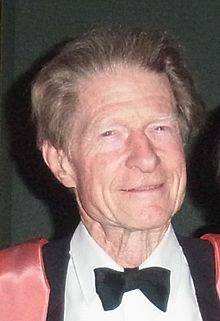Sir John Gurdon | |
|---|---|
 Sir John Gurdon in 2012 | |
| Born | John Bertrand Gurdon 2 October 1933 Dippenhall, Surrey, England |
| Citizenship | British |
| Alma mater | Eton College Christ Church, Oxford |
| Known for | Nuclear transfer, cloning |
| Awards | Paul Ehrlich and Ludwig Darmstaedter Prize (1977) William Bate Hardy Prize (1984) Royal Medal (1985) International Prize for Biology (1987) Wolf Prize in Medicine (1989) Edwin Grant Conklin Medal (2001) Albert Lasker Basic Medical Research Award (2009) Nobel Prize in Physiology or Medicine (2012) |
| Scientific career | |
| Fields | Biology and Developmental Biology |
| Institutions | University of Oxford MRC Laboratory of Molecular Biology University of Cambridge California Institute of Technology |
| Thesis | Nuclear transplantation in Xenopus (1960) |
| Doctoral advisor | Michail Fischberg[1] |
| Doctoral students | Douglas A. Melton Edward M. De Robertis |
| Website | www |
Sir John Bertrand Gurdon FRS (born 2 October 1933) is a British developmental biologist, best known for his pioneering research in nuclear transplantation[2][3][4] and cloning.[1][5][6][7]
Awarded the Lasker Award in 2009, in 2012, he and Shinya Yamanaka were jointly awarded the Nobel Prize for Physiology or Medicine for the discovery that mature cells can be converted to stem cells.[8]
- ^ a b Williams, R. (2008). "Sir John Gurdon: Godfather of cloning". The Journal of Cell Biology. 181 (2): 178–179. doi:10.1083/jcb.1812pi. PMC 2315664. PMID 18426972.
- ^ Gurdon, J. B.; Byrne, J. A. (2003). "The first half-century of nuclear transplantation". Proceedings of the National Academy of Sciences. 100 (14): 8048–8052. Bibcode:2003PNAS..100.8048G. doi:10.1073/pnas.1337135100. PMC 166179. PMID 12821779.
- ^ Gurdon, J. B. (2006). "From Nuclear Transfer to Nuclear Reprogramming: The Reversal of Cell Differentiation". Annual Review of Cell and Developmental Biology. 22: 1–22. doi:10.1146/annurev.cellbio.22.090805.140144. PMID 16704337. S2CID 6185731.
- ^ Gurdon, J. B.; Melton, D. A. (2008). "Nuclear Reprogramming in Cells". Science. 322 (5909): 1811–1815. Bibcode:2008Sci...322.1811G. doi:10.1126/science.1160810. PMID 19095934.
- ^ Kain, K. (2009). "The birth of cloning: An interview with John Gurdon". Disease Models and Mechanisms. 2 (1–2): 9–10. doi:10.1242/dmm.002014. PMC 2615171. PMID 19132124.
- ^ Gurdon, J. (2003). "John Gurdon". Current Biology. 13 (19): R759–R760. doi:10.1016/j.cub.2003.09.015. PMID 14521852. S2CID 12271157.
- ^ Gurdon, J. (2000). "Not a total waste of time. An interview with John Gurdon. Interview by James C Smith". The International Journal of Developmental Biology. 44 (1): 93–99. PMID 10761853.
- ^ "The Nobel Prize in Physiology or Medicine – 2012 Press Release". Nobel Media AB. 8 October 2012.